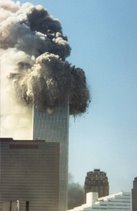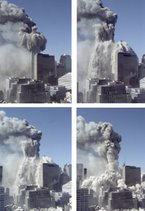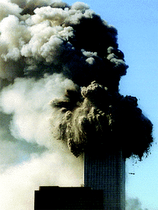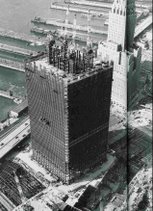The introduction to his book can be read here:
http://www.upress.umn.edu/ConspiracyTheories.html
Professor Fenster is often asked for his opinion on the "9/11 conspiracy theorists," most recently in today's Tampa Tribune, where he is quoted as follows:
"Conspiracies are part of every political culture," says Mark Fenster, a University of Florida law professor and author of the 2001 book "Conspiracy Theories: Secrets and Power in American Culture."
The Scripps Howard poll may reflect disillusionment over Iraq, Katrina and political scandals, he says.
"You ask people if they believe the government could have been behind 9/11, and they say, 'I wouldn't put it past them.'"
Fenster says similarities exist between the effects of the JFK assassination and 9/11 attacks. The whole country watched both events. Images were seared into people's brains through television.
http://www.tbo.com/life/MGB42ZJXWVE.html
He is also quoted by Scripps Howard here:
"What has amazed me is not that there are conspiracy theories, but that they didn't seem to be getting any purchase among the American public until the last year or so," Fenster said. "Although the Iraq war was not directly related to the 9/11 attacks, people are now looking back at 9/11 with much more skepticism than they used to."
http://newspolls.org/story.php?story_id=55
Professor Fenster was also interviewed by Canadian Broadcasting Corporation Radio. A critique of his comments on CBC Radio by Michael Keefer, Professor of English as the University of Guelph, is here:
http://www.globalresearch.ca/index.php?context=viewArticle&code=KEE20060829&articleId=3090
The critique raises points similar to mine. After praising Fenster's work, Keefer says:
But I can’t help wondering why Professor Fenster thought himself qualified to comment on current historical and materials-science research into the events of September 11, 2001, and why he thought it appropriate to conflate this kind of research with the popular-culture paranoia on which he is indeed an expert.
Maybe because Fenster has no problem with participating in the delegitimation of inquiries into 9/11, which his own research shows is the purpose of the term "conspiracy theory." Keefer is too polite in my opinion -- I think Fenster's actions are highly irresponsible.
Fenster's CBC Radio interview, which I have not yet listened to in full, is here:
http://www.cbc.ca/thecurrent/2006/200608/20060818.html
(Notice how CBC Radio begins with satire about NASA losing Apollo tapes -- "it's time to re-open that old TV studio." Yes, of course, all "9/11 conspiracy theorists" think the moon landings were faked. Hah hah. Isn't the murder of over 3,000 people a barrel of laughs?)
Based on what I've heard so far, I see that deconstructing Fenster's comments on CBC Radio will have to wait, and now return to his comments in the Tampa Tribune.
Fenster's comments above may seem innocuous, as he has not compared 9/11 to UFOs or Holocaust denial. However, he assumes that his studies of the Illuminati, the Turner Diaries, millennialism, the X-Files, and similar phenomena are inherently applicable to citizens' concerns about the crimes of 9/11. This is not only offensive, it is highly irresponsible.
Although he does not invoke the more distasteful or outlandish theories here, instead comparing 9/11 only with JFK, Fenster understands that the term "conspiracy theory" is an insult that "groups its victim with such unsavory characters as militia members, Oliver Stone, computer hackers, and the John Birch Society, and accuses him or her of believing in a secret, omnipotent individual or group that covertly orchestrates the events of the world." Fenster understands that the term "conspiracy theory" is used "as a strategy of delegitimation in political discourse." Thus, what he does here is worse, as he groups both 9/11 and JFK in with the Turner Diaries, Illuminati, and X-Files, and he does it knowing the effect this will have.
Knowing the effect of the term "conspiracy theory," one would expect Fenster to be more careful about using the term, particularly about as grave an issue as 9/11. He may think the questions about the official story of 9/11 are completely irrational, but has not published anything on the substance of these questions. Even for the conspiracies he discusses in his book, Fenster disavows any attempt to provide "the most logical explanations of the plots on which conspiracy theorists obsess."
I may be obsessed with finding a logical explanation for the events of 9/11, but that does not make me a "conspiracy theorist." It makes me a thinking, caring citizen. If the official explanation made any sense whatsoever, I could live with some gray areas.
Given that Fenster is an expert on the effects of characterizing a position as "conspiracy theory," it is fair to hold him, of all people, to a higher standard of care before characterizing a position as a "conspiracy theory."
Fenster's view of "conspiracy theories" is typical of "progressive" intellectuals: such theories are pathological responses to secrecy and power by the ignorant masses, who are too unsophisticated to understand "the relations of production and ideological structures of domination." Noam Chomsky, Chip Berlet, Alexander Cockburn, and Michael Albert make very similar arguments, blaming 9/11 conspiracy theorists for diverting the left from the worse crimes of capitalism. I'm still waiting for Chomsky to explain what would be a worse crime than 9/11, "even if it were true."
I wrote Professor Fenster the letter below, initially intending to send it to him. I have decided to post here instead, and will email him the link should he wish to respond.
---------------------------------------------
Dear Professor Fenster:
I think 9/11 was likely an "inside job." I've never read the Turner Diaries and I don't watch the X-Files. I don't think the Zionists or the Illuminati did 9/11. Christianists scare me more than Islamists. I think Ruby Ridge and Pine Ridge were both handled wrongly by the FBI. Am I a "conspiracy theorist"?
I have seen you quoted several times in articles about "9/11 conspiracy theories," most recently in the Tampa Tribune. I've not had a chance to read your book, but reading the introduction at your website, I see that your argument is more complex than has been portrayed in these articles, and seems based on laudable ideals of participatory democracy.
As quoted in the Tampa Tribune, however, you either engage or are used in the very strategy of delegitimation that you describe in your book. As an expert in communications, you know the effect of characterizing questions about the official story of 9/11 as "conspiracy theories." You express concern about the disabling effects of "conspiracy theories" on political activism, while allowing your ideas to be used to disable the political activism of millions of Americans and to characterize their concerns as "marginal and extreme."
I question whether your "disillusionment" theory is applicable at all to questions about 9/11. Sure, it may be true that Iraq, Katrina, and scandals like Enron and Abramahof have made the American people more open to consider the criminality and indifference to human life of the current regime. If the American people knew more about the EPA's lies about the safety of New York's air post-9/11, and the emerging damage to rescuers' health that has resulted, they might be even more dis-illusioned.
On the other hand, it could be that rational suspicion about 9/11 is independently contributing to the anger that shows up in Scripps polls. Citizens' belated realization they are being lied to, and their growing willingness to question these lies. may be due to the wearing off of the trauma of 9/11 and the lifting of its chilling effect on free speech and free thought. As a doctor of philosophy you must know that correlation is not causation.
You suggest that there is no rational basis for belief in government complicity in 9/11, and that these beliefs are driven only by "disillusionment." I say that removal of illusions has allowed a more rational and objective view of the government's statements and actions.
The lack of substantive proof and dizzying leaps of logic you describe are indeed important - they apply to the official explanations of what happened on 9/11. Government complicity in at least a coverup is self-evident. It is wrong to shift the burden of proof to the American people, who lack the information necessary to "prove" government complicity and are ill-served by both the press and academia in getting that information.
Given the expertise for which you are invited to comment on the "9/11 conspiracy theories," and given that you show no special understanding of the issues surrounding 9/11, is it unfair to say that the only responsbile comment for you to make as an expert is that we should be very careful not to use the term "conspiracy theory" to characterize questions about 9/11?
Your thesis is that secrecy engenders "conspiracy theories," and you have written as a lawyer about the need for more robust enforcement of open government laws. Do you have any concerns about government secrecy surrounding 9/11, which was even criticized by members of the 9/11 Commission? Did you state those concerns in your interviews, and if so and you were quoted incompletely or out of context, did you object?
It is clear that you reject a priori the possibility of government complicity in 9/11. This is illogical, and given your excellent intellectual training, I can only attribute it to the psychological handicaps of your position in what you call "the relations of production and ideological structures of domination." Structural critiques can as easily be applied to you, Chomsky, Berlet, and Cockburn, who do not have any special claim on "progressive" thought.
As you state, with "conspiracy theories," closure does not occur, interpretation does not stop, and the political does not become transparent.
In criminal law, closure can occur, interpretation can stop, the crime can become transparent, the perpetrators can be punished, and the community's trust in their government can be restored.
Thousands of Americans died on 9/11, and thousands more Americans and hundreds of thousands of human beings have been killed and maimed because of the post-9/11 "War on Terror," which is not over yet. These crimes are ongoing, and the perpetrators are still at large.
Your book was written in 1999, and you disavow any need to analyze the particular "plots on which conspiracy theorists obsess." Therefore, it is tremendously irresponsible for you to assume that your work on militias, Turner Diaries, Illuminati, and the like is applicable to 9/11.
JFK may have some applicability, in the sense that the comparison of this crime to the other "conspiracy theories" is also strategic delegitimation. The murderers of JFK (and RFK and MLK) are likely dead, so I am not as concerned about your lumping JFK in as the result of "scapegoating, racism, and fascism."
In relation to 9/11, a much more interesting, as well as more responsible, phenomenon for you to study is the distortions of science by government agencies like the National Institute of Technology and Standards and professional bodies like the American Society of Civil Engineers. The bar associations to which we both belong might also be an interesting subject to study. These institutions are indeed pathological in their patently absurd explanations of the 9/11 "collapses" of the World Trade Center towers, and in their acceptance of these patently absurd explanations. Structural critiques indeed have a place in considering 9/11.
Please look at the picture below, and when viewing it, please remember three things:
(1) the official explanation is that this is a picture of a gravity-driven collapse;
(2) NIST did not model this "global collapse" beyond the point that it "ensued," because they could not with any semblance of rationality;
(3) hundreds of American citizens are being killed in this picture.



Am I a scapegoater, a racist, or a fascist because I demand that the perpetrators of this crime be brought to justice? Based on what you said on CBC Radio, I will ask: Am I seeking a "black and white" answer to what is a "gray" area? Am I looking for a "villain," when the government has already provided me with one?
Please understand that I am perfectly willing to believe that radical jihadists did this without any assistance from any American government, military, or private assistance. The first question is what is "this"? If you think it is "paranoid" to ask these questions, then it seems that your fine education has closed your mind more than opened it.
Can you honestly explain this by the "stuctural inequities inherent in capitalism" and "the vagaries of coincidence and mistake"?
I will stop now, as this is turning into a rant. I trust you will think a little harder before you use the term "conspiracy theory" to characterize a position, and I hope you will consider whether or not your work is being used in pursuit of the progressive values I think we share.
I apologize for posting anonymously, but my position within the relations of production and ideological structures of domination is less secure than yours.
Or maybe I'm just paranoid.
Sincerely,
Ningen









5 comments:
I'm not surprised to find that Chip Berlet has an interview with Professor Fenster here:
http://www.publiceye.org/antisemitism/nw_fenster.html
Fenster criticizes either/or thinking:
New Internationalist: Aren't you just finding another way to defend the status quo and marginalize people who believe in conspiracy theories as an explanation for power relationships in society?
Fenster: That assumes an either/or proposition that is the basis of most conspiracy theories, and mainstream political thought as well: Either you defend the status quo or you commit to a simplistic theory of power.
But he engages in either/or thought himself: either you are a progressive intellectual that is able to view issues structurally, or you are a populist, committed to a simplistic theory of power, and prone to xenophobia.
Talking about globalization, Fenster states:
Conspiracy theorists see these problems as parts of a larger effort to create a one-world government or as parts of some other purposive project by some boogeyman or other. Easy to explain, simple, powerful.
Guess what? I understand the complexities of transnational capitalism. I support the United Nations, and think it would be wonderful if the U.S. honored international law. I know globalization is as much, if not more, a structural issue as an issue of design though trade law. I've read Doug Henwood.
I also think that covert psychological operations exist, and wonder who did the one on 9/11.
Whatever. Separate issues, and I do not think Professor Fenster has any special expertise to say what is and is not "credible" about 9/11.
Michael Parenti has written that structural analysis and conspiracy analysis are not mutually exclusive.
http://www.questionsquestions.net/
documents2/conspiracyphobia.html
How is it that in our culture Oliver Stone is an "unsavory character"? Is it because of JFK? That's it? And if so many people agree that the official story of the assasination is a coverup, is it really accurate to call him "unsavory"?
Salvador, Platoon, Talk Radio, Born on the Fourth of July, JFK, Natural Born Killers, Nixons -- are these the films of a "conspiracy theorist," or of an artist that dares to question the government and mass media?
It seems fair to say that at least when it come to Oliver Stone, Professor Fenster has incorporated some corrupted data into his model.
Note Berlet's defamatory implication in putting Professor Fenster's generalizations about "conspiracy theories" on a webpage about "antisemitism."
Berlet and Fenster agree on which kinds of government misconduct are approved for consideration by the enlightened left:
http://www.publiceye.org/articles/
articles.php?topic=35
I used to be able to find good info from your articles.
Post a Comment